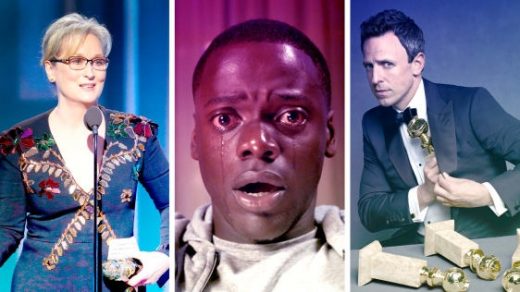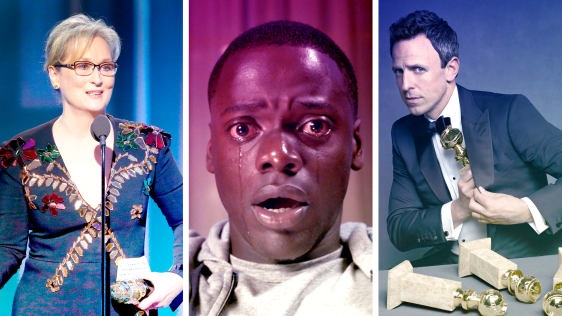Political Statements, Black Dresses, And Surprise Wins: What To Expect At The Golden Globes This Sunday
Last year, Meryl Streep took a bold stance against Donald Trump in the most public way possible: during a powerful Golden Globes acceptance speech. Now, the absurdly iconic actor may win another Golden Globe on Sunday night for her role in a film that serves in part as a commentary on–and rebuke to–the Trump presidency. It’s just been that kind of a year.
The game show president was just the start of it, though. After nine months of Hollywood responding to the Twitter-happy commander in chief, Hollywood became rocked by a cluster bomb of sex scandals. What started as a handful of men getting exposed as irredeemable dirtbags has morphed into a prolonged attack on systemic sexism in Hollywood and other industries–something that will absolutely be addressed at the first major award show of the year.
While all eyes will be on Streep to speak her mind again this Sunday, there are plenty more people and moments to watch out for during the 2018 Golden Globes ceremony.
Memorable Monologue

As one hopefully joking headline read, the Golden Globes needed a feminist host this year, so they got Seth Meyers. While the NBC telecast could have made a bolder statement hiring past hosts Tina Fey and Amy Poehler, or the network’s current Good Place star Kristen Bell, it could have done worse. Meyers spent his 2017 speaking truth to power, culminating in a devastating speech about Trump’s reaction to Charlottesville. There is no chance Meyers will squander the opportunity to share his typically trenchant observations with a significantly larger audience than he commands on Late Night. There may be some winning moments throughout the entire broadcast, but monologues are where the host gets to shine–and this year the host will have no shortage of things to say.
Sartorial Statements
Ordinarily, the hacky red-carpet question du jour is “Who are you wearing?” This year, it will be something closer to “Why are you wearing?” Several women who are either nominated for awards or presenting them are expected to wear black as a silent protest of sexual misconduct in Hollywood. Others will be wearing Time’s Up pins, a nod to the broad initiative that women like Eva Longoria and Shonda Rhimes recently helped launch, which is focused on combating sexual harassment in every industry. Expect some of the usual tabloid coverage of award show fashions to turn into more of a scorecard on who is adhering to the protest protocol, and who is bucking the trend. Of course, the real heroes of the #MeToo movement–and really, every other movement: men–recently announced that they too would raise a fist in solidarity by also wearing black to the Globes, a groundbreaking deviation from what men usually wear to such ceremonies. Men in Black: It’s not just the name of an exhausted Will Smith franchise anymore.
Another Big #MeToo Moment
As Rose McGowan, one of the heroes to emerge from the Harvey Weinstein fallout, has mentioned, silent protest may not be enough. (That she felt compelled to mention it with regards to Meryl Streep specifically, though, was unfortunate.) Beyond what anyone is wearing to the ceremony this year, someone will have to make a big speech about the reckoning in Hollywood. (Or Trump. Or BOTH.) The question is, who will it be? Jessica Chastain, who is nominated for Molly’s Game, seems like a possibility if she wins, given that she has been an outspoken advocate for women in the industry and beyond. Emma Watson is presenting, and as an ambassador for He For She, a solidarity campaign for the advancement of women, she likely has a lot of thoughts on the current state of affairs. Hopefully, one of the male nominees will speak out about men’s role in addressing not only systemic abuse but salary inequality in the future. If done just right, such a speech could earn this mystery man a reenactment of the famous Meryl applause GIF.
Best Picture Voter Bias
In anything resembling a normal year, we would have all been talking about Warren Beatty and Jane Fonda accidentally announcing the wrong film as Best Picture winner at last year’s Oscars for at least several months. Instead, it was a two-day story that many of us occasionally recalled later on, like an acid flashback or something that took place in a fever dream. (“Wait, did that really happen?”) The first major hint at what might win Best Picture at this year’s Oscars will be whatever takes top honors at the Golden Globes. (Even though there is no overlap between voting members of the Hollywood Foreign Press Association, which hands out the Globes, and the Academy of Motion Pictures Arts and Sciences, which decides the Oscars, the Globes have generally been a good indicator of the way the wind is blowing.)

Best Motion Picture–Drama will likely come down to Call Me By Your Name and The Post, while Best Musical or Comedy will probably be between Get Out and Lady Bird. These movies don’t exist in a vacuum, though, and some of the voters deciding between them will be hyperconscious of what they’re “saying” with their vote, and who they’re saying it to and about.

As a tweet by prominent film writer Mark Harris suggests, those voting on this year’s awards might not take Get Out seriously enough as a contender to give it Best Picture and might consider Call Me By Your Name too similar to last year’s Oscar-winning Moonlight, which was also a gay coming-of-age movie. Never mind that Get Out has the distinction of ecstatic critical consensus, seismic cultural impact, shockingly big box office results, and a timely commentary on race relations–it could be too “weird” (read: groundbreaking and brilliant) for the Academy. Also disregard the fact that Call Me Your Name is different in almost every way from Moonlight except for the fact that both feature gay characters, the HFPA (and the Academy) might be too busy patting themselves on the back for Moonlight to expand their horizons a second year in a row. After all, giving Speilberg’s The Post Best Picture makes a different kind of subversive statement: the need to hold the current administration accountable. It’s the kind of statement the Academy, at least, is far more comfortable making.
By no means is the HFPA a progressive organization, but it has been known to be less resistant to the changing times than the AMPAS. In 2006, for instance, it recognized Brokeback Mountain as Best Picture in its category, while the Academy Awards (shockingly) went with Crash. (A moment of silence for Crash being a Best Picture winner, please.) So even though the HFPA crowned La La Land last year, sometimes the riskier, more compelling choice happens at the Golden Globes.
Fast Company , Read Full Story
(28)



